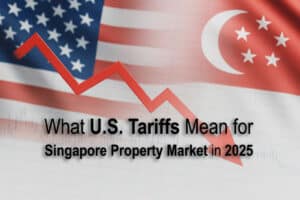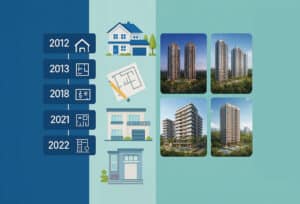The Singapore property market is at a crossroads. Uncertainty is in the air with U.S. tariffs looming and a 90-day delay in their full implementation. How will this affect Singapore’s export-driven economy and, by extension, its real estate landscape? This moment calls for a steady hand and a clear strategy for prospective buyers and investors. Whether you’re entering the market during turbulent times or calmer waters, the principles of smart property ownership remain the same.
This guide offers practical, actionable tips to help you navigate uncertainty while building a foundation for long-term success. We’ll cover financial prudence, long-term planning, diligent property analysis, fund preparation, staying informed, and diversifying your property investments—complete with examples and tools from PropertyNet.SG. Let’s dive in.
1. Practice Financial Prudence: Safeguard Your Future
Property is a major financial commitment, and overextending yourself can leave you vulnerable—especially in uncertain times. Here’s how to keep your finances resilient:
- Don’t Max Out Your TDSR: The Total Debt Servicing Ratio (TDSR) limits monthly debt repayments to 55% of your gross income, per the Monetary Authority of Singapore (MAS) guidelines. While banks may approve loans up to this ceiling, it’s a risk you don’t need to take. Aim for a TDSR of 30% to 40% instead. This buffer protects you if interest rates rise or income drops unexpectedly. For example, a couple earning $15,000 monthly might qualify for an $8,250 monthly mortgage, but keeping it at $5,000 leaves room for life’s curveballs.
- Build Emergency Cash Reserves: Set aside 6 to 12 months of living expenses beyond your downpayment and mortgage. This fund should cover housing costs and commitments like your children’s school fees, family holidays, or caring for ageing parents. If you’re in a job not aligned with Singapore’s growth sectors—like tech or healthcare—consider a larger cushion (e.g., 12-18 months) to weather potential layoffs.
- Factor in All Commitments: Property ownership isn’t just about the mortgage. Maintenance fees, property taxes, insurance, and renovations add up. Then there’s life: university fees for your kids, a dream vacation, or unexpected medical bills. A holistic budget ensures you’re not stretched thin. For instance, a $2 million condo might come with $500 monthly maintenance fees—small, but it’s a cost to plan for.
- Mind Job Market Risks: Singapore’s government prioritizes industries like AI, biotech, and sustainability. If you’re in a declining sector — say, traditional manufacturing or retail — job security could be at risk during an economic downturn. But here’s the good news: you can upskill and stay ahead! The Singapore Government’s SkillsFuture Credit (check it out at MySkillsFuture) lets you tap into courses to boost your career — think coding, data analytics, or sustainable business practices. To future-proof your income for your growth, allow us to do a bit of national service by promoting the link to My Skills Future; here’s the link for you to find out more about MySkillsFuture: https://www.myskillsfuture.gov.sg/content/portal/en/index.html. We are not sponsored for this. 😝
- Tool Tip: Use our Affordability Calculator to map your finances. Enter your income, debts, and expenses to see how much you can borrow without compromising stability.
Why It Works: Financial prudence gives you flexibility. Whether it’s a market dip or a personal setback, you’ll have the resources to stay afloat and capitalize on opportunities when others can’t.
2. Plan for the Long Term: Ride the Waves
Singapore’s property market has a track record of bouncing back from downturns. A long-term perspective lets you weather short-term storms and emerge stronger.
- Learn from History: Past cycles show that downturns are temporary. After the 2008 financial crisis, private home prices fell 20% but recovered within two years. The COVID-19 dip in 2020 gave way to a boom in 2021-2022. You will likely see an upcycle if you can hold your property for 7 to 10 years. Short-term uncertainty — like tariff delays—becomes noise in the bigger picture.

- Avoid Short-Lease Traps: For resale properties, steer clear of 99-year leaseholds with less than 65 years remaining. These may look like bargains, but their value erodes as the lease shortens, and the next buyer’s loan and CPF usage will be pro-rated based on their age, making it a tougher sale. Imagine buying a condo with a 65-year lease in 2025—by 2045, with only 45 years left, buyers might struggle to secure financing, and you’re stuck with a depreciating asset. Instead, consider new launches where the lease is fresh, and the choice of good units is better. For example, a new launch in Lentor Central Residences offers a full 99-year lease and modern layouts, making it a safer bet than an old 99-year leasehold property with dwindling years.
- Patience Pays Off: Global trade disruptions, like U.S. tariffs, may force Singapore to pivot its economy—perhaps toward regional markets or domestic demand. The government is adept at navigating such changes, but it takes time. A long-term hold ensures you’re not forced to sell at a low point.
Why It Works: Property isn’t a get-rich-quick scheme. Those who stay the course through volatility often see the biggest gains, while short-term speculators risk getting burned.
3. Analyse Properties Diligently: Know Your Exit Strategy
Not all properties perform equally, especially when markets turn. Rigorous analysis separates the winners from the losers.
- Who’s Your Next Buyer?: Before you buy, picture your future buyer. A 3-bedroom unit near top schools in Bukit Timah appeals to families, while a 2-bedroom condo in Tanjong Pagar suits young professionals. Skip 1-bedroom units if your budget allows—they’re much harder to resell at a good price due to limited demand, especially in a downturn. If you’re on a tighter budget, look for resale 2-bedroom units, which carry lower risk and appeal to a broader market. For example, a client once bought a 2-bedroom resale condo in Serangoon—its proximity to amenities and schools made it a hot pick five years later.
- Consider Executive Condos (ECs) if Eligible: If you meet the eligibility criteria (e.g., Singaporean citizen, household income under $16,000, no private property ownership in the last 30 months), ECs are a low-risk asset class worth exploring. They come with a 5-year Minimum Occupation Period (MOP) before you can sell to Singaporeans or PRs, and after 10 years, they’re fully privatized, opening up to foreign buyers. ECs offer private condo-like amenities at a lower entry price — new launches in 2025, Lumina Grand, Altura, Novo Place & Aurelle of Tampines start from 1,4xx PSF. Thus far, all, and I repeat, ALL our clients who have made ECs their homes have benefited tremendously from their decision, enjoying lifestyle upgrades and strong capital appreciation as these properties mature.
- Rental Viability: If you’re investing, identify your tenants. Properties near business hubs (e.g., Raffles Place) attract expats, while those near universities (e.g., Clementi) draw students. Check rental yields—aim for 3% or higher. A 2-bedroom condo renting for $4,500 monthly on a $1.8 million purchase price is a solid bet.
- Tested Value Shines in Downturns: In boom times, even average properties rise in price. But when the tide recedes, quality matters. With established infrastructure, mature estates like Toa Payoh or Jurong East hold value better than untested new towns. Properties near popular schools have also maintained their value very well. Avoid overpaying for hype—compare psf rates to spot true value.
Why It Works: Diligent analysis protects your investment. In good times, it maximizes returns; in tough times, it minimizes losses. You’ll own a property that’s always in demand.
4. Prepare Funds in Advance: Stay Liquid
Committing to a property without ready funds is a gamble—especially when markets are shaky. Plan to avoid scrambling.
- Resale Timelines: The Loan-to-Value (LTV) ratio for resale properties is now 75%, meaning you’ll need a 25% downpayment upon completion. For a $2 million condo, that’s $500,000 due within 8 to 10 weeks of signing the Option to Purchase (OTP)—have it ready in cash or CPF.
- New Launch Schedules: New launches spread payments over the years, depending on construction progress. After a 5% booking fee, progressive payments align with milestones. A $2.5 million unit might need $125,000 initially, then 8 weeks after booking, $375,000 to be paid and thereon. Use our Progressive Payment Calculator to forecast your needs.
- Avoid Market Mishaps: We’ve seen buyers plan to fund purchases with stock gains only to lose out when markets crash. In a recent case, a buyer (not ours 😜) forfeited around $20,000 in option fees after the stock crash. Sell assets early or keep cash on hand to stay safe.
Why It Works: Property deals move fast, and delays cost money—or deals. Prepared funds keep you in control of whatever the market throws at you.
5. Diversify Your Property Portfolio: Spread the Risk
Putting all your eggs in one basket can be risky in uncertain times. Diversifying across locations, districts, and property types—including industrial and commercial properties—can balance your portfolio and position you for growth.
- Mix Property Types: Don’t limit yourself to residential properties. Explore industrial and commercial properties for higher returns, where tenants often sign longer leases. Food industry hubs like Eco@Mandai and CT FoodNex are prime examples. These properties cater to food processing and storage—irreplaceable aspects of any economy, even during uncertainty. Tenants in these sectors, such as food manufacturers or logistics firms, often commit to 5- to 10-year leases, providing stable rental income. For instance, a unit in CT FoodNex might cost $2.4 million, yielding 4% to 5% annually, and likely remain resilient due to their essential role in the food supply chain.
- Risk and Reward: A diversified portfolio—say, a condo in OCR or RCR for rental income, a commercial unit for stability, and a luxury CCR property for growth—ensures you’re not overly exposed to any market segment.
Why It Works: Diversification spreads your risk across market cycles. If one segment underperforms, others can balance your returns, ensuring long-term stability and growth.
6. Stay Informed: Knowledge Is Your Edge
In a volatile world, staying ahead means staying informed. Combine global awareness with local expertise for smarter decisions.
- Track Macro Trends: U.S. tariffs, interest rate shifts, and trade pacts ripple through Singapore. A Fed rate hike could raise mortgage costs; a trade deal might boost confidence. Follow these trends to time your moves.
- Property Updates: Local news—like new cooling measures or infrastructure projects—shapes the market. Join our Telegram Channel or WhatsApp Channel for timely insights.
- Lean on Experts: A skilled property agent is your ally. Look for one with analytics chops and risk management know-how. They’ll spot undervalued gems or warn you off risky buys — like that overpriced launch everyone’s chasing.
Why It Works: Information turns uncertainty into opportunity. You’ll know when to act when to wait, and how to win.
Final Thoughts: Build Your Foundation Now
Uncertainty—whether from tariffs or other unexpected events—tests your preparedness. By practicing financial prudence, planning for the long term, analyzing diligently, setting aside funds, diversifying your property investments, and staying informed, you can do more than just survive; you can position yourself for success. These strategies are effective in any market, helping you become a smarter buyer or investor, regardless of the economic climate.
Explore PropertyNet.SG’s tools and community to kickstart your journey. The right strategy for your next property move begins today.
🚀 Stay Ahead in the Property Market!
Be the first to receive exclusive updates, launch reviews, insider deals, and real-time alerts — directly on your preferred app.
👉 Join our community now:
🌐 Spread Knowledge. Share with Others.
Click any of the icons below to share this content with those who may benefit from it.







